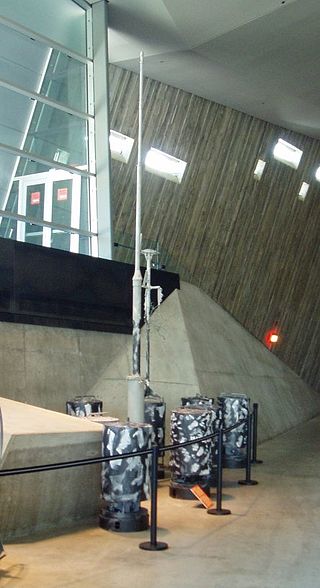
Weather Station Kurt on display at the Canadian War Museum (Wikipedia photo).
On October 22, 1943, Germany made its only armed landing on the North American continent of the Second World War. On that day, the U-boat U-537 anchored at the northern end of Labrador and its crew loaded ten cylindrical canisters, each weighing about 220 pounds, onto rubber rafts and then ashore. Together, these canisters constituted an automated weather station, which the Germans had given the code name Weather Station Kurt. The station was one of 26 manufactured by Siemens and deployed around the North Atlantic to give German meteorologists data on weather as it moved across the Atlantic. Other stations had been deployed in Greenland; Bear Island, Norway; Spitsbergen; and Franz Josef Land. Another such station was intended for North America, but the sub carrying it was sunk en route.
One of the canisters contained the meteorological instruments, and one contained a 150-watt Lorenz 150 FK radio transmitter. (A specimen of this transmitter can be found in LA6NCA’s collection.) The remaining canisters contained nickel-cadmium batteries to power the system. The system was designed to operate for up to six months, sending a two minute transmission every three hours on 3940 kHz. The data was sent in Morse, which was to be manually transcribed by German radio operators. Some technical details, diagrams, and wartime photos of the station can be viewed at the links below.
The station was camouflaged, and components were marked in English with the words “Canadian Meteor Service.” Not only was there no such agency, but Labrador was part of Newfoundland and not Canada. The station was placed far enough North in the hope, apparently realized, that the Innuit of Labrador would not encounter it. To confuse anyone who might stumble upon the remote site, empty American cigarette packages were strewn about. A satellite image of the remote site can be viewed at Google Maps.
The station apparently worked flawlessly, but but was subject to jamming from a source that has never been identified. The Allies apparently never learned of the station’s existence, but It apparently provided weather data for only a few days.
The station was abandoned and not found until 1981. A German researcher working on an unrelated project stumbled onto records of the station in 1977. A retired Siemens engineer who was working on records of the company also stumbled upon references to the station about the same time. He contacted a Canadian Defence historian, who eventually sent a team to the site in 1981. Although some canisters had been disturbed, the station was still there. The station is currently on display at the Canadian War Museum.
References
- Description of station and wartime photo at DF1NH (German)
- Description at uboat.net
- Weather Station Kurt at Wikipedia
- The War Comes to Canada at Canadian War Museum
- Deutsche automatische Wetterstationen in der Arktis 1942-1945 (contains technical description and diagrams, German, with English abstract and captions). English translation at Google
Read More at Amazon

Pingback: Our Facebook Contest! | OneTubeRadio.com
Douglas, who went to the site with a team in 1981 and found the station still there, although canisters had been opened and components strewn about the site.